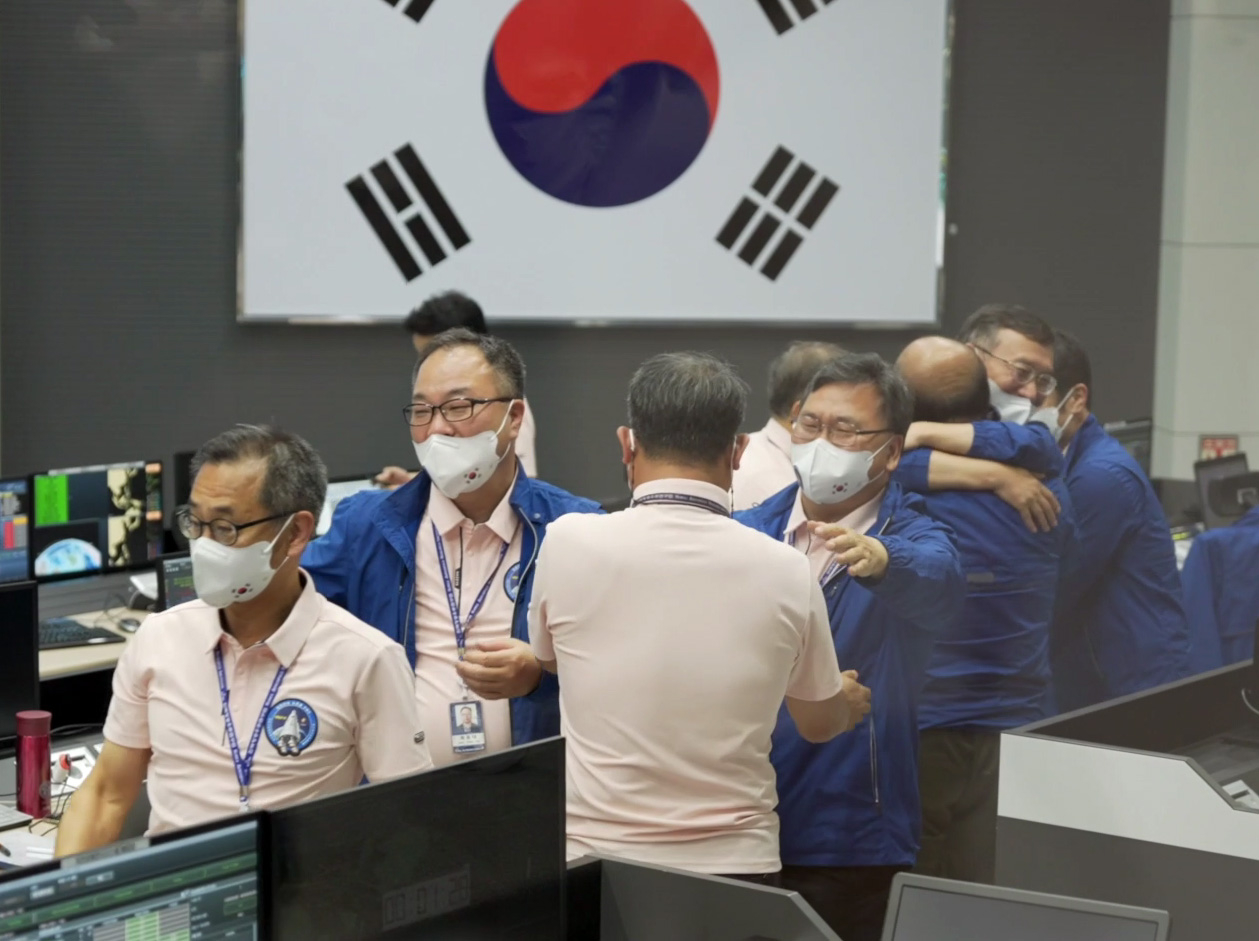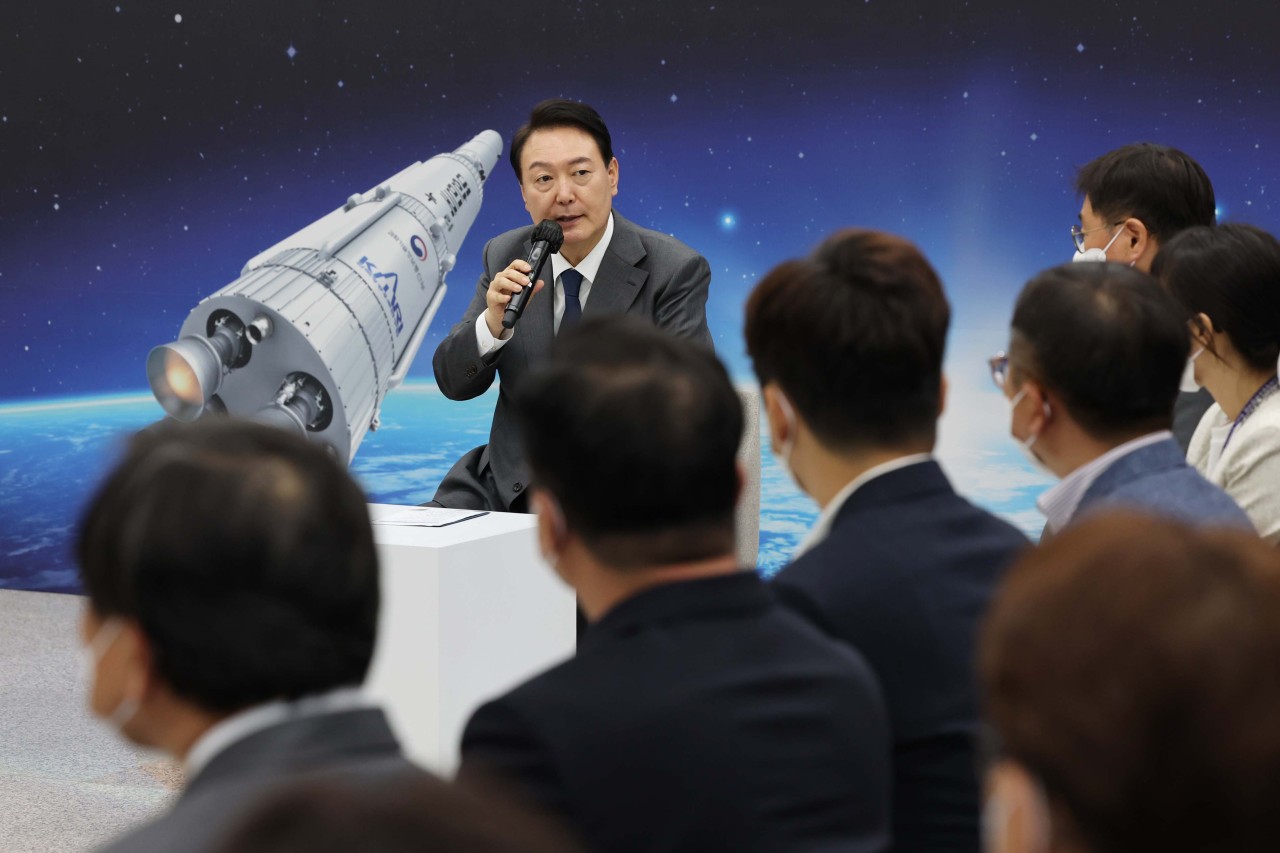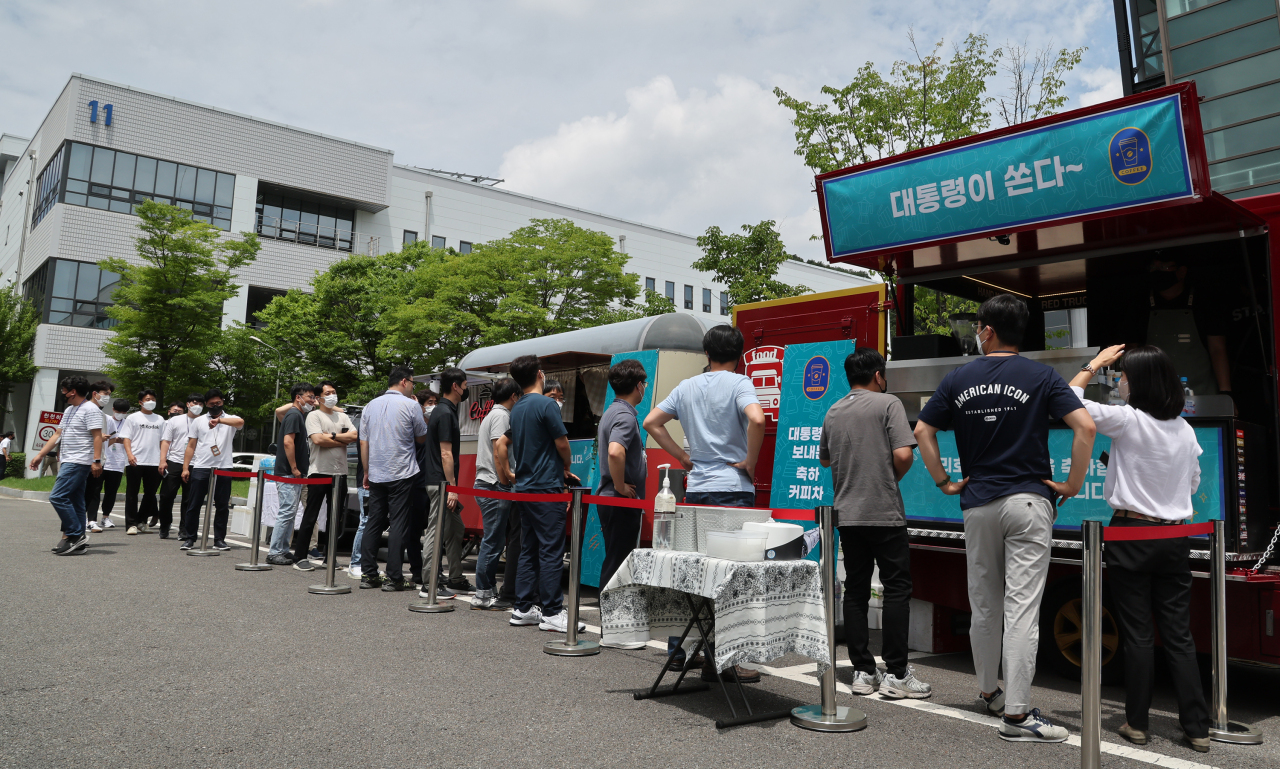[Newsmaker] [Reporter’s Notebook] The dark side of Nuri rocket’s success
Workers at Korea’s space agency, real heroes behind historic launch, deserve genuine recognition, promises for better environment
By Kan Hyeong-wooPublished : July 18, 2022 - 15:23

While the entire country was still relishing the launch of South Korea’s first domestically developed rocket last month, unionized workers and engineers at the Korea Aerospace Research Institute came out with a rather surprising statement.
“The satisfaction and joy of the second launch are passing by as we despair in the unimproved reality,” a statement by the union read.
Citing government data, the union pointed out that the annual salary of the national space agency’s first-year staff ranked 21st out of the 25 government-funded research institutes under the National Research Council of Science and Technology in 2020. The union added that the wage gap is about 10 million won ($7,600) per year between KARI workers and the best-paid state research institutes.
But the statement failed to make the headlines, as the government leaders and media were busy highlighting executives and companies as “heroes of the Nuri rocket.” Little mention was made of the KARI engineers who spent years making that success happen.
Countless hours of research and development by KARI workers helped Korea become the only seventh country in the world to launch a satellite weighing 1.5 tons or heavier. Despite their accomplishment, KARI workers say they worry about a lack of future talent to keep Korea’s competitiveness in space technology going.
Younger employees with promising talent are moving to different jobs or thinking about doing so because of their relatively low salaries, they said. According to a local recruiting service, entry jobs at KARI, including those who have master‘s and Ph. D degrees, were given annual salaries of 38 million won on average.
Of some 1,000 workers at KARI, over 60 percent are members of the labor union, and a majority of them are younger staff in their 20s and 30s, according to Shin Myoung-ho, head of the KARI labor union. Over 80 percent of its members hold research positions.
On top of the lower salaries, the union underlined that a number of workers have not been compensated for their overtime work or promised incentives. The union said it is preparing for a legal battle if KARI and the Ministry of Economy and Finance do not take the necessary steps to revise payroll rules to fix the matter.
“The satisfaction and joy of the second launch are passing by as we despair in the unimproved reality,” a statement by the union read.
Citing government data, the union pointed out that the annual salary of the national space agency’s first-year staff ranked 21st out of the 25 government-funded research institutes under the National Research Council of Science and Technology in 2020. The union added that the wage gap is about 10 million won ($7,600) per year between KARI workers and the best-paid state research institutes.
But the statement failed to make the headlines, as the government leaders and media were busy highlighting executives and companies as “heroes of the Nuri rocket.” Little mention was made of the KARI engineers who spent years making that success happen.
Countless hours of research and development by KARI workers helped Korea become the only seventh country in the world to launch a satellite weighing 1.5 tons or heavier. Despite their accomplishment, KARI workers say they worry about a lack of future talent to keep Korea’s competitiveness in space technology going.
Younger employees with promising talent are moving to different jobs or thinking about doing so because of their relatively low salaries, they said. According to a local recruiting service, entry jobs at KARI, including those who have master‘s and Ph. D degrees, were given annual salaries of 38 million won on average.
Of some 1,000 workers at KARI, over 60 percent are members of the labor union, and a majority of them are younger staff in their 20s and 30s, according to Shin Myoung-ho, head of the KARI labor union. Over 80 percent of its members hold research positions.
On top of the lower salaries, the union underlined that a number of workers have not been compensated for their overtime work or promised incentives. The union said it is preparing for a legal battle if KARI and the Ministry of Economy and Finance do not take the necessary steps to revise payroll rules to fix the matter.

President Yoon Suk-yeol, meanwhile, declared that Korea would open up a “space economy,” and reiterated his presidential campaign pledge to install a state-level aerospace agency during his visit to KARI headquarters in Daejeon on July 6.
Congratulating the engineers and industry officials for the success of the Nuri rocket, Yoon sent food trucks to offer free coffee for up to 1,000 people at KARI.
“Given that the government declared the establishment of a space agency and the development of the aerospace industry at the state level, researchers and industry officials should have been welcoming and hopeful. However, no cheers or applause were heard anywhere,” the union said after Yoon’s visit.
The Yoon administration’s vision of a space economy induced feelings of déjà vu, the union said, citing the previous Moon administration’s space industry strategy announced in January 2019.
The union criticized the government’s “delusional concept” of a space economy as the country’s current level of technology would not yield economic benefits.
The union explained that more than 100 billion won is spent on each launch project developed by Korean technology, while commercial projectiles are already being traded for about a third of that. It is also impossible to compete with other countries that manufacture 20 satellites a week when it takes five years for Korea to develop one satellite, it added.
Citing that the US has two separate organizations -- the Federal Aviation Administration and NASA -- in charge of air transportation and space exploration, the union also denounced the Yoon administration’s pledge to set up a national aerospace agency in the southern coastal city of Sacheon, South Gyeongsang Province, far from Daejeon where the KARI headquarters is located.
“The space agency should be located in the administrative capital where authorities can plan space policies together,” said the union, criticizing what they claimed Yoon administration‘s “regional favoritism” toward the Gyeongsang Provinces.
KARI employees lined up to get Yoon’s coffee to show their appreciation to the president and hopes that the future might be better than the past. But no meaningful promises have been made for the real heroes behind the success of the Nuri rocket.
As the union asked the government to set up an environment where researchers can focus on doing their jobs, the Yoon administration should reconsider what is best for the country’s future space industry if it truly wishes to achieve a “space economy.”
Congratulating the engineers and industry officials for the success of the Nuri rocket, Yoon sent food trucks to offer free coffee for up to 1,000 people at KARI.
“Given that the government declared the establishment of a space agency and the development of the aerospace industry at the state level, researchers and industry officials should have been welcoming and hopeful. However, no cheers or applause were heard anywhere,” the union said after Yoon’s visit.
The Yoon administration’s vision of a space economy induced feelings of déjà vu, the union said, citing the previous Moon administration’s space industry strategy announced in January 2019.
The union criticized the government’s “delusional concept” of a space economy as the country’s current level of technology would not yield economic benefits.
The union explained that more than 100 billion won is spent on each launch project developed by Korean technology, while commercial projectiles are already being traded for about a third of that. It is also impossible to compete with other countries that manufacture 20 satellites a week when it takes five years for Korea to develop one satellite, it added.
Citing that the US has two separate organizations -- the Federal Aviation Administration and NASA -- in charge of air transportation and space exploration, the union also denounced the Yoon administration’s pledge to set up a national aerospace agency in the southern coastal city of Sacheon, South Gyeongsang Province, far from Daejeon where the KARI headquarters is located.
“The space agency should be located in the administrative capital where authorities can plan space policies together,” said the union, criticizing what they claimed Yoon administration‘s “regional favoritism” toward the Gyeongsang Provinces.
KARI employees lined up to get Yoon’s coffee to show their appreciation to the president and hopes that the future might be better than the past. But no meaningful promises have been made for the real heroes behind the success of the Nuri rocket.
As the union asked the government to set up an environment where researchers can focus on doing their jobs, the Yoon administration should reconsider what is best for the country’s future space industry if it truly wishes to achieve a “space economy.”








![[KH Explains] No more 'Michael' at Kakao Games](http://res.heraldm.com/phpwas/restmb_idxmake.php?idx=644&simg=/content/image/2024/04/28/20240428050183_0.jpg&u=20240428180321)

![[Weekender] How DDP emerged as an icon of Seoul](http://res.heraldm.com/phpwas/restmb_idxmake.php?idx=644&simg=/content/image/2024/04/25/20240425050915_0.jpg&u=)








![[Herald Interview] Mistakes turn into blessings in street performance, director says](http://res.heraldm.com/phpwas/restmb_idxmake.php?idx=652&simg=/content/image/2024/04/28/20240428050150_0.jpg&u=20240428174656)
